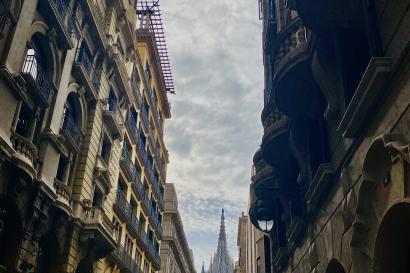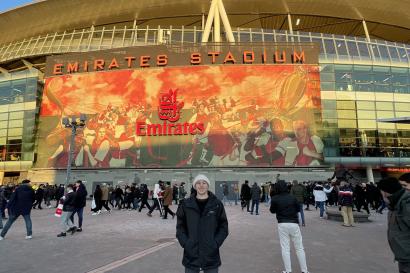“You said You-Know-Who’s name!” said Ron, sounding both shocked and impressed. “I’d have thought you, of all people —”
“I’m not trying to be brave or anything, saying the name,” said Harry, “I just never knew you shouldn’t. See what I mean? I’ve got loads to learn…”
*
The first line I read from a Harry Potter book wasn’t the chronological opening, the sentence about the infamous Mr. and Mrs. Dursley and their perfected pretense of total normality. It was something else, a sentence I scarfed up almost by accident, at the age of seven or eight, sitting on a crowded bus next to a boy with a big winter coat and a name I didn’t know. He had a book open in his lap, and when the bus came to a stop, I snuck a peek over at the page, trying to see if I could guess what he was reading. I couldn’t. The words took me to a world of two school-aged boys and someone called You-Know-Who, but I didn’t know who You-Know-Who was, so I averted my eyes again, let them drift from the white page to the snow out the window.
I got the chance to return to that scene last Friday, on the Harry Potter Tour at Warner Brothers Studios in London, the city I visited over midterm break with three of my friends. We had just emerged from the first studio onto a great wooden train platform where a single scarlet steam engine sat smoking silently. In the corner of the station, there was a set of the interior of a train car that held two mannequins, both small and boyish, one with red hair, one with black, an enormous pile of sweets between them.
I stared at the scene for a full minute, and when I turned away, I had tears in my eyes.
I want to pause here to say that I don’t think I’ve ever been one to be oversentimental about memorabilia, about collectibles. My mother, who grew up in a house with too much stuff, has always taught me to keep what I needed and bin the rest. My sister used to cry each year when we dragged our Christmas tree out to the curb, but I didn’t see the point in keeping something that had outlived its use. Similarly, I didn’t see the point in buying something that had no use. To be clear, I’m no paragon of anti-consumerism: I’ll admit to once possessing an embarrassingly large box of Barbies and their assorted accessories (although admittedly, my sister was the co-owner), and I spent hours mooning over the American Girl catalogue every December. But I’ve always been skeptical about the way franchises have sought to accessorize books I loved. I hated new editions featuring actors’ faces and stickers proclaiming, "Now a Major Motion Picture!" I’ve never seen a movie adaption I’ve preferred to the book version, with the single exception of Matilda, mostly because if I was suspicious of literary-inspired movies, I was also suspicious of Roald Dahl.
Harry Potter was no exception. I saw all the movies in the theatre, but I never went to the premieres and I invariably left each showing somewhat disappointed, convinced that it hadn’t measured up. Michael Gambon would never be Albus Dumbledore, the third movie had totally skipped over the entire “Marauders” history, and the black smoke that the Death Eaters left behind them whenever they Disapparated was as totally nonsensical as the white smoke the Order of the Phoenix members left behind whenever they Disapparated. (If it were that easy to tell a good wizard from an evil one, my sister once exclaimed, Snape hardly could have concealed his true allegiance from Voldemort.)
Maybe I’ve added all this background to justify how much I spent on my studio tour ticket (the pounds-to-dollars exchange rate is rather rough, incidentally), to prove to you that I’m not just some sap sobbing over old movie sets as pathetically as Kreacher once sniffled over Sirius’s dad’s old trousers. If I liked the tour, perhaps I’m trying to say, if I found it meaningful, it must be more than crap and kitsch. It must be something real. Probably, I can’t convince you of this, if you haven’t seen the studios, and, in the logic of the con-woman, I suppose you can’t see the studios unless you, too, hand over the exorbitant cost of a ticket. So I’ll just say that I found the experience of re-encountering the sets that formed the backdrop of the Harry Potter rather moving, in a way I find difficult to articulate other than to say that it was sort of magical. (Go ahead and groan. Maybe I did drink the Kool-Aid.)
But if I have any underlying motive, in writing this, it isn't to convince you to take the trip to London, to fork over the money for your own tour of the Harry Potter studios. It's just to give you some sense of what standing on those sets made me feel, to make my own memorial to the Boy Who Lived through describing someone else's. So I'd like to tell you this: when I first stepped into the studios and saw the Great Hall open wide before me, it was a bit like stepping into my own imagination of the place I saw open before me when I read the books for the first time, so many years ago, and all the many, many times I've encountered those words since, whether flipping through the dog-eared pages of our falling-apart editions or leaning back in my seat to hear Jim Dale’s voice on a long family car trip or running through the streets of my neighborhood, my iPod playing not the chords of “Let Me Down Easy” but the opening music of the audio book for the Prisoner of Azkaban.
As I stood and looked at the manufactured tables, at the fake pumpkins and possibly real pastries (the tour guide wouldn’t say what was edible, only that some of it was), I could almost hear the sounds of Quirrell yelling about a troll, could almost see Neville Longbottom lifted upon the shoulders of the Gryffindors, having just secured for them the House Cup. I’d imagined it so many times. And here I was, standing upon it, or, anyway, the closest thing there was in this world to it. Likewise, when I saw the machinery of the set of the Burrow, the robotic knitting needles and automatic carrot computerized to chop itself, I thought of Mrs. Weasley, stirring up soup and singing Celestina Warbeck, of Mr. Weasley, babbling about batteries. I thought of George, with the gap in his head but never in his jokes, of Ginny, blushing scarlet, not yet the brave person she’d become.
Umbridge’s putrid-pink office made me remember how much my sister and I had loved to loathe her, how much abuse we’d piled upon her over years of reading and rereading the passages about the Senior Undersecretary to the Minister and her stupid cough and asinine rules and high-pitched titter. Dumbledore's office, with its numerous portraits and piles of books, made me remember how much I loved that wizened old man with a crooked nose and a sharp wit and a scar shaped like the London Underground. I wanted to sit in his office and feel the comfort that so often eluded Harry when he sat there, too preoccupied with the mysteries of his past, the secrets Dumbledore could only haltingly reveal to him, to enjoy the safety and comfort and love of that study.
I could go on. Every nook and cranny of that place seemed to speak of something to me, seemed to strike a chord in my memory of a character I’d loved or hated or simply hadn’t understood, of a scene that had made me laugh, a part that had made me cry. And it wasn’t just the things I saw that recalled all this to my memory, but the very fact that there were so many people around me who had come along too, actuated by the same impulse to see the world they had imagined. I stood before the chess pieces that Harry and Ron had conquered in the first book with two girls who loved those two as much as I did. I clinked Butterbeers with three people who remembered how much Harry had liked the stuff when he’d first tried it.
And it wasn’t just the people inside those walls I felt connected to. As I made my way through Diagon Alley and Dumbledore’s office, past glass cases of dummy doubles and discarded props, I remembered the infinity of inside jokes my sister and I had made over the years, the way we used to flick quotes back at forth at each other, plumbing the depths of our memories to refer to our favorite passages as well as the more obscure ones. Even when we argued, I could always count on Rachael to be willing to talk to me about Harry Potter. I remembered how my brothers used to race around our living room with shopping carts, re-enacting the Platform 9 ¾ scene from the first book ad infinitum (and perhaps, ad nauseum). I thought of my mother, braiding my hair and telling me about the books before I'd ever read them, and my father, who has never read the books but who imbibed enough of the world from the rest of us to be able to make a joke about Muggles that still makes me laugh. I remembered the emails I’d sent to my best friend growing up that were full of guesses and theories about what was to come, in the last book, a correspondence so much more free and uninhibited than the tenuous one we sustain now. I remembered how my other best friend had gasped at the movie theatre next to me when, at the end of Half-Blood Prince, the Inferi emerged from the lake.
In the English class I took the first semester of my freshman year, we studied the work of Vladimir Nabokov, who, my teacher said, cared little if you liked his characters, cared little if they won your heart. He simply wanted you to get caught in his beautiful language; words were all that mattered, independent realities, beautiful things so utterly distinct from the ugly materiality of the world. Perhaps I’m remembering it incorrectly; perhaps my teacher overstated it. But if I’m right about Nabokov, then I think Nabokov was wrong, for I’ve never cared for books as vessels of language as much as I’ve cared for them – and I have cared for them – as vessels of characters, of people.
A few days after my time at Warner Brothers, I had the chance to travel to Edinburgh, in Scotland, to eat a lunch of vegetarian chili and salad at the café where J.K. Rowling is said to have written the first drafts of Harry Potter and the Philosopher’s Stone. And if there’s something more magical than movie sets and film studios, it’s the imagination of a small, blonde woman, huddled over some scraps of paper with a pen, scribbling down the words that would give birth to a wizard, to a story, to a narrative of heroism and tragedy and romance and love, a love that exists between the words and between the characters and beyond them, too.
*
“After all this time?”
“Always,” said Snape.

Chelsea Thomeer
I'm a rising junior at Williams College majoring in English and political science. I love reading and running, Jane Austen and J.K. Rowling, pumpkin bread and pretzels, The Grapes of Wrath and green tea. I'm spending a semester in Ireland to study Irish literature and to work on my own writing.








